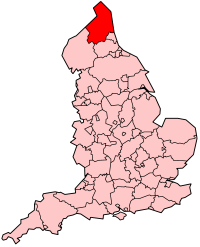Related Research Articles

Imbolc or Imbolg, also called Saint Brigid's Day, is a Gaelic traditional festival. It marks the beginning of spring, and for Christians, it is the feast day of Saint Brigid, Ireland's patroness saint. Its traditional date is 1 February, about halfway between the winter solstice and the spring equinox. Historically, its traditions were widely observed throughout Ireland, Scotland and the Isle of Man. Imbolc is one of the four Gaelic seasonal festivals, along with: Beltane, Lughnasadh and Samhain.

Lindisfarne, also called Holy Island, is a tidal island off the northeast coast of England, which constitutes the civil parish of Holy Island in Northumberland. Holy Island has a recorded history from the 6th century AD; it was an important centre of Celtic Christianity under Saints Aidan, Cuthbert, Eadfrith, and Eadberht of Lindisfarne. The island was originally home to a monastery, which was destroyed during the Viking invasions but re-established as a priory following the Norman Conquest of England. Other notable sites built on the island are St Mary the Virgin parish church, Lindisfarne Castle, several lighthouses and other navigational markers, and a complex network of lime kilns. In the present day, the island is an Area of Outstanding Natural Beauty and a hotspot for historical tourism and bird watching. As of February 2020, the island had three pubs, a hotel and a post office.

Northumberland is a ceremonial county in North East England, bordering Scotland. It is bordered by the Scottish Borders to the north, the North Sea to the east, Tyne and Wear and County Durham to the south, and Cumbria to the west. The town of Blyth is the largest settlement.

Corn dollies or corn mothers are a form of straw work made as part of harvest customs of Europe before mechanisation.

Whitsun is the name used in Britain, and other countries among Anglicans and Methodists, for the Christian holy day of Pentecost. It falls on the seventh Sunday after Easter and commemorates the descent of the Holy Spirit upon Christ's disciples. In England it took on some characteristics of Beltane, which originated from the pagan celebration of Summer's Day, the beginning of the summer half-year, in Europe. Whitsuntide, the week following Whitsunday, was one of three holiday weeks for the medieval villein; on most manors he was free from service on the lord's demesne this week, which marked a pause in the agricultural year. Whit Monday, the day after Whitsun, remained a holiday in Britain until 1971 when, with effect from 1972, the ruling Conservative Government decided to permanently replace it, following a five year trial period, with a Spring Bank Holiday on the last Monday in May. Whit had been the occasion for many varied forms of celebration, and was of significant cultural importance. It was a custom for children to receive a new set of clothes, even among the poorest families, a tradition which continued well into the 20th century.

A kelpie, or water kelpie, is a shape-shifting spirit inhabiting lochs in Irish and Scottish folklore. It is usually described as a grey or white horse-like creature, able to adopt human form. Some accounts state that the kelpie retains its hooves when appearing as a human, leading to its association with the Christian idea of Satan as alluded to by Robert Burns in his 1786 poem "Address to the Devil".

Bonnie Dundee is the title of a poem and a song written by Walter Scott in 1825 in honour of John Graham, 7th Laird of Claverhouse, who was created 1st Viscount Dundee in November 1688, then in 1689 led a Jacobite rising in which he died, becoming a Jacobite hero.

In English folklore, Black Shuck, Old Shuck, Old Shock or simply Shuck is the name given to a ghostly black dog which is said to roam the coastline and countryside of East Anglia, one of many such black dogs recorded in folklore across the British Isles. Accounts of Black Shuck form part of the folklore of Norfolk, Suffolk, the Cambridgeshire Fens and Essex, and descriptions of the creature's appearance and nature vary considerably; it is sometimes recorded as an omen of death, but, in other instances, is described as companionable.

Northumberland, England's northernmost county, is a land where Roman occupiers once guarded a walled frontier, Anglian invaders fought with Celtic natives, and Norman lords built castles to suppress rebellion and defend a contested border with Scotland. The present-day county is a vestige of an independent kingdom that once stretched from Edinburgh to the Humber, hence its name, meaning literally 'north of the Humber'. Reflecting its tumultuous past, Northumberland has more castles than any other county in England, and the greatest number of recognised battle sites. Once an economically important region that supplied much of the coal that powered the industrial revolution, Northumberland is now a primarily rural county with a small and gradually shrinking population.
Here Northumbria is defined as Northumberland, the northernmost county of England, and County Durham. According to 'World Music: The Rough Guide', "nowhere is the English living tradition more in evidence than the border lands of Northumbria, the one part of England to rival the counties of the west of Ireland for a rich unbroken tradition. The region is particularly noted for its tradition of border ballads, the Northumbrian smallpipes and also a strong fiddle tradition in the region that was already well established in the 1690s. Northumbrian music is characterised by considerable influence from other regions, particularly southern Scotland and other parts of the north of England, as well as Irish immigrants.

The Diocese of Newcastle is a Church of England diocese based in Newcastle upon Tyne, covering the historic county of Northumberland, as well as the area of Alston Moor in Cumbria.

The Anglo-Scottish border is a border separating Scotland and England which runs for 96 miles (154 km) between Marshall Meadows Bay on the east coast and the Solway Firth in the west.
7th Parachute Regiment, Royal Horse Artillery is a regiment of the Royal Artillery in the British Army. It currently serves in the field artillery role with 16 Air Assault Brigade Combat Team, and is equipped with the L118 Light Gun.

An ala or hala is a female mythological creature recorded in the folklore of Bulgarians, Macedonians, and Serbs. Ale are considered demons of bad weather whose main purpose is to lead hail-producing thunderclouds in the direction of fields, vineyards, or orchards to destroy the crops, or loot and take them away. Extremely voracious, ale particularly like to eat children, though their gluttony is not limited to Earth. It is believed they sometimes try devouring the Sun or the Moon, causing eclipses, and that it would mean the end of the world should they succeed. When people encounter an ala, their mental or physical health, or even life, are in peril; however, her favor can be gained by approaching her with respect and trust. Being in a good relationship with an ala is very beneficial, because she makes her favorites rich and saves their lives in times of trouble.

"The Dowie Dens o Yarrow", also known as "The Braes of Yarrow" or simply "Yarrow", is a Scottish border ballad. It has many variants and it has been printed as a broadside, as well as published in song collections. It is considered to be a folk standard, and many different singers have performed and recorded it.
Lord Saltoun and Auchanachie, is a Scottish folk song.

A truce term is a word or short phrase accepted within a community of children as an effective way of calling for a temporary respite or truce during a game or activity, such as tag or its variants. Common examples in English speaking cultures are barley, fainites, crosses, kings and exe(s) in the United Kingdom, pegs and nibs in New Zealand and variants of barley in Australia. In the United States, terms based on time-out have, from the 1950s onwards, largely supplanted earlier common terms based on kings and exe(s). Since the late 1980s time-out has been recorded in other English-speaking cultures besides the US. Examples of use of truce terms are if a child has a stitch or wants to raise a point on the rules of the game.
Jean Lorimer (1775–1831) was a friend of the poet Robert Burns, often referred to by him as the "Lassie wi' the lint-white locks" or "Chloris". Lorimer was born at Craigieburn House on a small estate near Moffat and from 1788 to 1791 was a neighbour of Burns when he was living at Ellisland Farm, her father's new farm being at Kemmishall or Kemys Hall, Kirkmahoe Parish, two miles to the south of Ellisland on the opposite bank of the Nith. Burns commented "The Lady on whom it was made, is one of the finest women in Scotland" in a letter to George Thomson, enclosing one of the two dozen or so songs that he wrote for her. They first met when she was a teenager through his excise duties bringing him to their farm.

Lancelot Allgood was a British landowner and politician who served as High Sheriff of Northumberland in 1746, and as member of parliament for Northumberland in the 10th Parliament of Great Britain between February 1748 and 1754. He also served as a deputy Lord Lieutenant of Northumberland.
References
- 1 2 3 4 Notes on the folk-lore of the northern counties of England and the borders By William Henderson, 1866, pages 227-228.
- ↑ Folk-lore: or, A collection of local rhymes, proverbs, sayings, prophecies, slogans, &c. relating to Northumberland, Newcastle-on-Tyne, and Berwick-on-Tweed, Michael Aislabie Denham, 1858, pp. 136-137